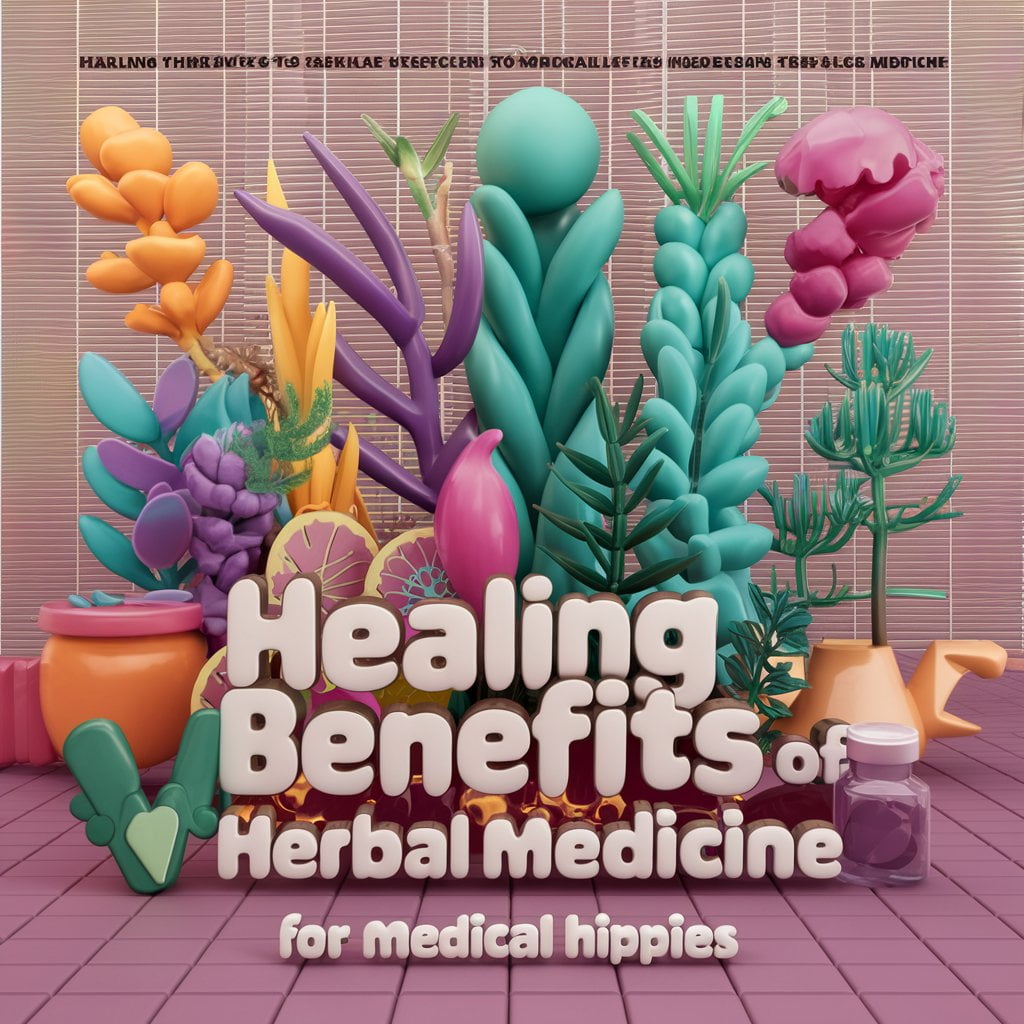10 Powerful Herbs: A Comprehensive Guide for Medical Hippies
Introduction to Herbal Medicine
Herbal medicine, a cornerstone of traditional healing practices, has been used for thousands of years across various cultures. As modern medical hippies, we recognize the power of nature and seek to integrate these time-honored remedies into our holistic health approaches. This comprehensive guide explores 10 powerful herbs, their benefits, and how to incorporate them into your daily wellness routine.
Global Insight
According to the World Health Organization, about 80% of the world’s population relies on traditional medicine for their primary health care needs, with a significant portion involving the use of herbs. This statistic underscores the enduring relevance and potential of herbal medicine in our modern world.
1. Turmeric
Turmeric, the golden spice of life, has been a staple in Ayurvedic medicine for centuries. Its active compound, curcumin, is responsible for most of its powerful effects.
- Powerful anti-inflammatory properties
- Potent antioxidant
- May improve brain function and lower risk of brain diseases
- Potential to prevent and treat cancer
- May help in managing arthritis symptoms
How to Use:
Add turmeric to your diet by incorporating it into curries, smoothies, or try making golden milk. For a more concentrated dose, consider turmeric supplements. To enhance absorption, combine with black pepper which contains piperine, a compound that can increase curcumin absorption by up to 2000%.
Latest Research
A 2021 study published in the journal Nutrients found that curcumin supplementation significantly improved exercise performance and reduced muscle damage in athletes. This suggests turmeric could be a valuable addition to sports nutrition regimens.
2. Echinacea
Echinacea is renowned for its immune-boosting properties. It’s native to North America and has been used by indigenous peoples for centuries.
- Strengthens the immune system
- May shorten the duration of common cold
- Potential anti-inflammatory effects
- May help manage anxiety
- Could aid in blood sugar control
How to Use:
Echinacea can be consumed as a tea, tincture, or in supplement form. It’s most effective when taken at the first sign of illness. For immune support, many herbalists recommend taking echinacea for 10 days, followed by a break of 4 days, and repeating this cycle.
Recent Study
A 2019 meta-analysis published in Complementary Therapies in Medicine found that echinacea supplementation significantly reduced the risk of recurrent respiratory tract infections and complications from these infections.
3. Ginger
Ginger is a versatile herb with a wide range of health benefits. It’s been used in traditional medicine systems around the world for thousands of years.
- Alleviates nausea and motion sickness
- Anti-inflammatory properties
- May reduce muscle pain and soreness
- Supports digestive health
- Potential to lower blood sugar levels
- May help reduce menstrual pain
How to Use:
Enjoy ginger as a tea, add it to stir-fries, or use it in baking. For nausea relief, try chewing on a small piece of fresh ginger. Ginger supplements are also available for a more concentrated dose. For maximum benefits, aim for 1-3 grams of ginger per day.
Emerging Research
A 2020 study published in Nutrients suggested that ginger supplementation might help improve insulin sensitivity and reduce the risk of diabetes. The study found that ginger increased the expression of GLUT4, a protein involved in glucose uptake.
4. Lavender
Lavender is well-known for its calming properties and pleasant aroma. It has been used for centuries in various forms for relaxation and healing.
- Promotes relaxation and reduces stress
- May improve sleep quality
- Potential analgesic properties
- May help alleviate symptoms of anxiety
- Could improve skin health
How to Use:
Use lavender essential oil in aromatherapy by adding a few drops to a diffuser. For sleep support, try placing a sachet of dried lavender under your pillow. Lavender tea can be enjoyed for its calming effects. For topical use, dilute lavender essential oil with a carrier oil before applying to the skin.
Recent Study
A 2020 systematic review published in Phytotherapy Research found that lavender, particularly in the form of Silexan (a standardized essential oil preparation), showed promising results in reducing anxiety symptoms comparable to some conventional treatments.
5. Ashwagandha
Ashwagandha is an adaptogenic herb that has been used in Ayurvedic medicine for over 3,000 years. It’s known for its ability to help the body manage stress.
- Reduces stress and anxiety
- May improve brain function and memory
- Potential to increase muscle mass and strength
- May reduce blood sugar levels
- Anti-inflammatory properties
- Could improve male fertility
How to Use:
Ashwagandha is typically taken in supplement form, either as capsules or powder. The recommended dosage is usually between 300-500 mg of a root extract taken twice daily with meals. It can also be added to smoothies or warm milk for a more traditional approach.
Latest Research
A 2019 study published in Medicine (Baltimore) found that ashwagandha supplementation was associated with a significant reduction in cortisol levels and perceived stress, as well as improvements in sleep quality in adults with self-reported high stress levels.
6. Chamomile
Chamomile is a gentle herb known for its calming properties. It has been used for centuries to promote relaxation and support digestive health.
- Promotes relaxation and sleep
- Supports digestive health
- May reduce symptoms of anxiety and depression
- Anti-inflammatory properties
- Potential to lower blood sugar levels
- May improve skin health
How to Use:
Chamomile is most commonly consumed as a tea. Steep 1-2 teaspoons of dried chamomile flowers in hot water for 5-10 minutes. For topical use, chamomile can be found in creams and ointments. Chamomile essential oil can be used in aromatherapy or diluted for topical application.
Recent Study
A 2019 clinical trial published in Phytotherapy Research found that long-term chamomile consumption significantly improved sleep quality in elderly people, suggesting its potential as a safe, natural sleep aid.
7. Peppermint
Peppermint is a refreshing herb that offers a range of health benefits. It’s particularly known for its effects on digestive health and respiratory function.
- Relieves digestive discomfort
- May reduce symptoms of IBS
- Can help alleviate headaches
- Potential to improve exercise performance
- May clear nasal passages
- Could have antimicrobial properties
How to Use:
Peppermint can be consumed as a tea, with 1-2 teaspoons of dried leaves steeped in hot water. Peppermint essential oil can be used in aromatherapy or diluted for topical application. For digestive issues, enteric-coated peppermint oil capsules are often recommended.
Latest Research
A 2019 meta-analysis published in BMC Complementary and Alternative Medicine found that peppermint oil was significantly more effective than placebo in reducing pain and global symptoms in adults with IBS.
8. Ginkgo Biloba
Ginkgo biloba is one of the oldest living tree species and its leaves have been used in traditional medicine for centuries. It’s particularly known for its potential cognitive benefits.
- May improve cognitive function
- Could reduce symptoms of anxiety and depression
- Potential to improve circulation
- May help with symptoms of dementia
- Could reduce PMS symptoms
- Antioxidant properties
How to Use:
Ginkgo biloba is typically taken as a supplement in the form of capsules or tablets. The standard dose is usually 120-240 mg per day, divided into three doses. It’s also available as a liquid extract or tea.
Recent Study
A 2020 systematic review published in Phytotherapy Research found that ginkgo biloba extract showed potential in improving cognitive function in patients with mild cognitive impairment and Alzheimer’s disease, particularly when used in conjunction with conventional treatments.
9. Valerian
Valerian is a herb native to Europe and Asia, known for its sedative properties. It has been used for centuries to promote relaxation and improve sleep quality.
- May improve sleep quality
- Could reduce symptoms of anxiety
- Potential to lower blood pressure
- May help with menstrual cramps
- Could improve stress management
- Potential cognitive benefits
How to Use:
Valerian is most commonly taken as a supplement in capsule or tablet form. For sleep, a typical dose is 300-600 mg taken 30 minutes to two hours before bedtime. It can also be consumed as a tea, using 2-3 grams of dried root steeped in hot water.
Latest Research
A 2020 systematic review and meta-analysis published in the Journal of Evidence-Based Integrative Medicine found that valerian root significantly improved sleep quality without serious adverse effects, supporting its use as a safe alternative to conventional sleep medications.
10. St. John’s Wort
St. John’s Wort is a flowering plant that has been used for centuries in traditional medicine. It’s particularly known for its potential to alleviate symptoms of depression.
- May help with mild to moderate depression
- Could reduce symptoms of anxiety
- Potential to improve mood
- May help with menopausal symptoms
- Could have wound-healing properties
- Potential anti-inflammatory effects
How to Use:
St. John’s Wort is typically taken as a supplement in capsule or tablet form. The standard dose for depression is usually 300 mg three times daily of an extract standardized to 0.3% hypericin. It can also be consumed as a tea.
Recent Study
A 2017 systematic review and meta-analysis published in the Journal of Affective Disorders found that St. John’s Wort was superior to placebo in treating mild to moderate depression and had similar efficacy to standard antidepressants, with fewer adverse effects.
Important Note:
St. John’s Wort can interact with many medications, including birth control pills, blood thinners, and some HIV medications. Always consult with a healthcare provider before using St. John’s Wort, especially if you’re taking other medications.
Embracing Herbal Wisdom in Modern Times
As medical hippies, we recognize the profound connection between nature and our well-being. These 10 powerful herbs represent just a fraction of the vast herbal pharmacy that nature provides. By incorporating these plants into our lives mindfully and respectfully, we can tap into centuries of traditional wisdom and complement modern healthcare practices.
The resurgence of interest in herbal medicine is not just a trend, but a recognition of the complex and beneficial relationships between plants and human health. As we continue to face new health challenges, the synergy between traditional herbal knowledge and modern scientific research offers exciting possibilities for holistic wellness.
Future Perspectives
The global herbal medicine market is projected to reach $411 billion by 2026, according to a report by Global Industry Analysts, Inc. This growth reflects increasing consumer interest in natural remedies and a growing body of scientific research supporting the efficacy of many herbal treatments.
Remember, while herbs can be powerful allies in our health journey, they should be used wisely and with respect. Always consult with a qualified healthcare practitioner before starting any new herbal regimen, especially if you have existing health conditions or are taking medications. The journey to holistic health is personal and ongoing. Stay curious, listen to your body, and continue to explore the wonderful world of herbal medicine.
Frequently Asked Questions
Discover more from Medical Hippie
Subscribe to get the latest posts sent to your email.

